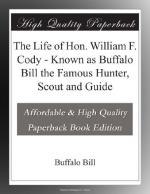I finally lost track of Brigham, and for several years I did not know what had become of him. Three years ago, while I was at Memphis, Tennessee, I met a Mr. Wilcox, who had been one of the superintendents of construction of the Kansas Pacific Railroad, and he informed me that he owned Brigham, and that he was at that time on his farm, only a few miles out of town. The next day I rode out with Mr. Wilcox and took a look at the gallant old horse. He was comfortably cared for in Mr. Wilcox’s stable, and looked the same clever pony that he always was. It seemed as if he almost remembered me, and I put my arms around his neck, as though he had been a long-lost child. Mr. Wilcox bought the horse at Wyandotte, from the gentleman who had won him at the raffle, and he intends to keep him as long as he lives. I am grateful that he is in such good hands, and whenever I again visit Memphis I shall surely go and see Brigham if he is still alive.
But to return to the thread of my narrative, from which I have wandered. Having received the appointment of guide and scout, and having been ordered to report at Fort Larned, then commanded by Captain Dangerfield Parker, I saw it was necessary to take my family—who had remained with me at Sheridan, after the buffalo-hunting match—to Leavenworth, and there leave them. This I did at once, and after providing them with a comfortable little home, I returned and reported for duty at Fort Larned.
CHAPTER XVI.
A COURIER.
The scouts at Fort Larned, when I arrived there, were commanded by Dick Curtis—an old guide, frontiersman and Indian interpreter. There were some three hundred lodges of Kiowa and Comanche Indians camped near the fort. These Indians had not as yet gone upon the war-path, but were restless and discontented, and their leading chiefs, Satanta, Lone Wolf, Kicking Bird, Satank, Sittamore, and other noted warriors, were rather saucy. The post at the time was garrisoned by only two companies of infantry and one of cavalry.
General Hazen, who was at the post, was endeavoring to pacify the Indians and keep them from going on the war-path. I was appointed as his special scout, and one morning he notified me that he was going to Fort Harker, and wished me to accompany him as far as Fort Zarah, thirty miles distant. The General usually traveled in an ambulance, but this trip he was to make in a six-mule wagon, under the escort of a squad of twenty infantrymen. So, early one morning in August, we started; arriving safely at Fort Zarah at twelve o’clock. General Hazen thought it unnecessary that we should go farther, and he proceeded on his way to Fort Harker without an escort, leaving instructions that we should return to Fort Larned the next day.




